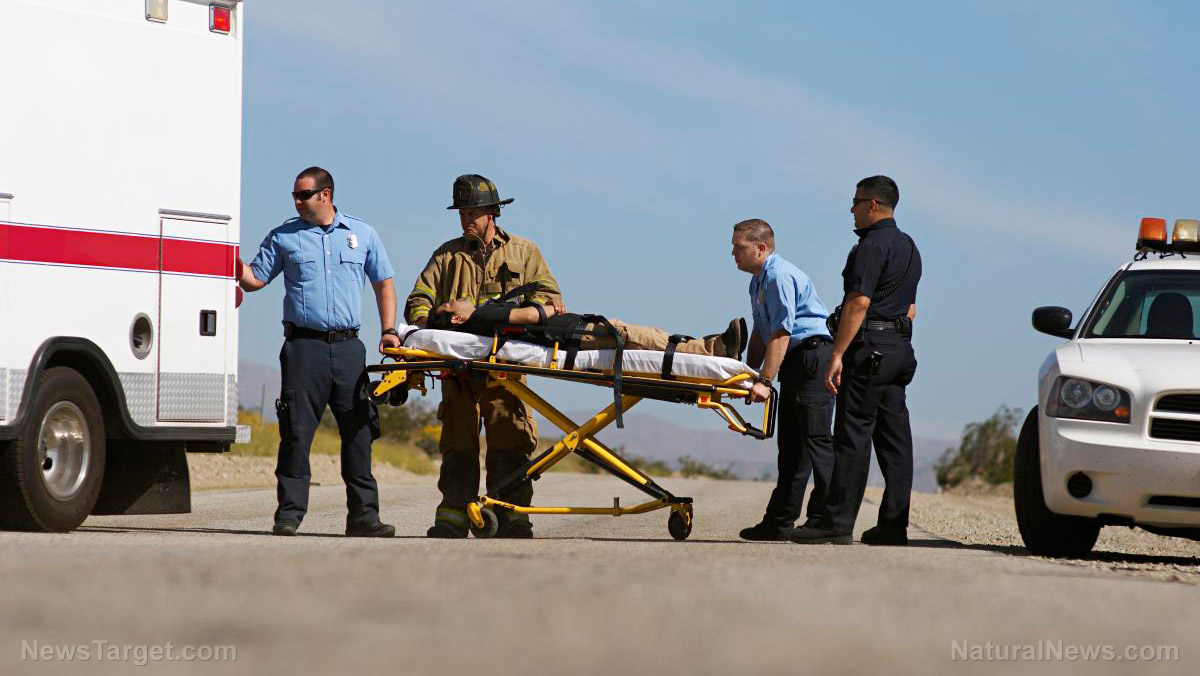Health systems collapsing around the country as L.A. County orders EMS not to transport patients who have “little chance” to survive
01/13/2021 / By JD Heyes

Health systems in America are under so much strain as new COVID-19 infections rise that emergency medical services in some parts of the country are being overwhelmed.
For instance, health officials in Los Angeles County have instructed ambulance crews not to transport any patients who have “little chance of survival,” The Epoch Times reported last week.
A directive from the Los Angeles County Emergency Medical Services Agency dated Jan. 4 instructs EMS personnel to also cut back on the use of oxygen throughout L.A. County, the most populous in all of California, which currently has a virus infection rate of 138 per 100,000 people, according to the state’s tracking system.
“Oxygen for the purposes of medication administration and CPAP may be used when needed,” the directive states, adding that patients with an O2 saturation of 90 percent or less should receive it.
“An oxygen saturation of 90% is sufficient to maintain normal tissue perfusion in most patients,” the directive adds.
The EMS agency noted further that “titrated oxygen with a higher target of 94% is recommended for the following specific conditions: carbon monoxide poisoning, suspected pneumothorax, shock, traumatic brain injury.”
The agency also noted that because of a serious shortage of hospital ICU beds in the county, EMS crews should not be transporting patients if they have suffered cardiopulmonary arrest and attempts to revive them have not been successful, the Los Angeles Times reported.
Before the pandemic, EMS crews typically transported patients to hospitals even if they had little-to-no-chance of pulling through.

At the present time, “many hospitals have reached a point of crisis and are having to make very tough decisions about patient care,” Dr. Christina Ghaly, director of L.A. County health services, told reporters earlier this month.
“The volume being seen in our hospitals still represents the cases that resulted from the Thanksgiving holiday,” she added during a briefing Monday. “We do not believe that we are yet seeing the cases that stemmed from the Christmas holiday. This, sadly, and the cases from the recent New Year’s holiday, is still before us, and hospitals across the region are doing everything they can to prepare.”
Besides EMS, hospitals are also adopting new policies aimed at opening up beds more quickly. Some sick patients are being discharged, for instance, though under normal circumstances they would remain in the hospital for continued observation. (Related: Liberal states facing a COLLAPSE of state incomes thanks to coronavirus shutdowns: Will pensions collapse, too?)
The LA Times adds:
Emergency rooms are so slammed that some patients are having to wait inside ambulances for as long as eight hours before a bed becomes available. That backlog ties up ambulances and keeps them from being able to respond to other emergency calls.
To deal with the shortage, officials have devised an emergency plan to create temporary “ambulance-receiving spaces” — set up just outside the emergency room entrance and often covered by tents or canopies — to accept patients.
Paramedics and EMTs may also be utilized to help monitor up to four patients at once in receiving spaces, which is different from the previous policy of one-on-one monitoring. This allows more ambulances to be freed up to respond to other calls.
“We’re likely to experience the worst conditions in January that we’ve faced the entire pandemic, and that’s hard to imagine,” said L.A. County Public Health Director Barbara Ferrer, the Times reported.
As such, the number of Wuhan coronavirus patients who have to be hospitalized will continue spiking “as long as our case numbers increase,” she said in a briefing.
“Everyone should keep in mind that community transmission rates are so high that you run the risk of an exposure whenever you leave your home,” Ferrer said. “Assume that this deadly, invisible virus is everywhere, looking for a willing host. Don’t let that be you or someone you care about.”
See more reporting like this at Pandemic.news.
Sources include:
Tagged Under: ambulance crews, Barbara Ferrer, Collapse, covid-19, Dr. Christina Ghaly, emergency services, EMS, EMTs, hospitalization, Hospitals, ICN, infection, Los Angeles, Los Angeles County, pandemic, paramedics, Public Health, spike, spread, virus, Wuhan coronavirus




















